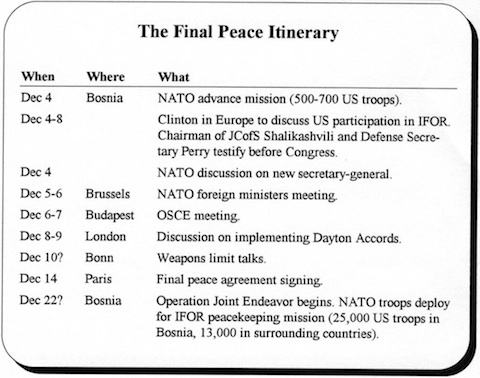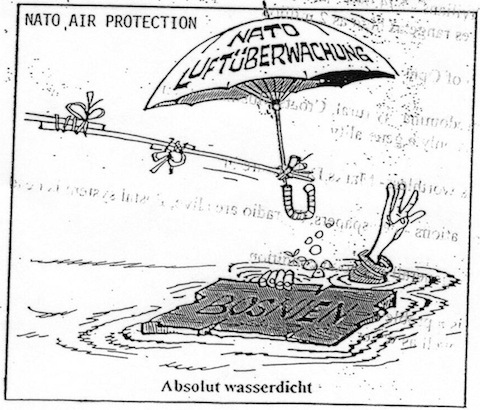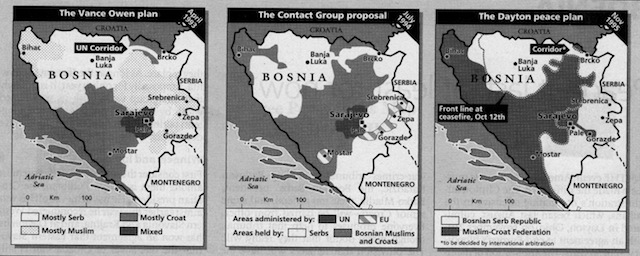 This Week: Clinton addresses nation, new NATO Secretary-General, US advance troops arrive in Bosnia.
This Week: Clinton addresses nation, new NATO Secretary-General, US advance troops arrive in Bosnia.
26 Nov 95
Groups of people in Sarajevo have begun to stone and flip over UN vehicles passing through Serbian sections of the city. One public demonstration was prevented yeserday in Ilidza, a suburb, as it was feared that it could turn violent.
27 Nov 95
Clinton said that NATO would send an advance party to Bosnia starting next week, with full NATO and US (IFOR) participation to begin in mid-December after the final peace treaty is signed. NGO and PVO participation in reconstruction is “essential to making peace endure”, he said. Clinton cited work on power plants, hospitals, factories and shops as being vital parts of that reconstruction.
![]()
Croat soldiers are systematically looting and burning private property in Mrkonjic Grad. Croatian forces took the region in the weeks before the peace conference but will return it to the Serbs rather than yield land to them along the Posavina corridor. Bosnian and Croat troops also hijacked several UN armored vehicles over the weekend.
![]()
NATO finalized its operations plan for deploying to Bosnia, but France, which is not a part of NATO’s integrated command structure is resisting turning overall command over to an American. The NATO foreign ministers are expected to approve the operations plan during their december 5-6 meetings. French intransigence could delay NATO’s deployment, which is currently scheduled for mid-December after the final peace treaty is signed.
![]()
Clinton addressed the nation on national TV Monday night, November 27, at 8:00 p.m. Eastern. Clinton used the 22 minute address to ask for the support of Congress and the American people for US participation in NATO’s Bosnia peacekeeping mission.Clinton emphasized two key points: One, that the US mission will be “clear, limited and achievable.” Two, that “it is our responsibility as Americans” to lead the mission. Each point was made at least three times each.
From the rest of the speech:
“Europe’s freedom and Europe’s stability is vital to our national security.”
“They [the Bosnian factions] made a commitment to peace … to build a peaceful, democratic future.”
“Now the war is over.”
“I refuse to send American troops to fight a war.”
“Risks to our troops will be minimized … They will have the authority to respond immediately … with overwhelming force.”
“We must be prepared for the possibility [of casualties].”
“It is the right thing to do.”
The mission will “last one year.”
28 Nov 95
A CNN/Gallup poll taken after Clinton’s Bosnia speech found more Americans support his position than before. However, Clinton is still short of a majority. 46% favor sending US troops, while 40% are opposed. 53% believe US involvement will last more than Clinton’s stated 1-year limit; 35% believe it will less. The margin of error is +/- 4%.
![]()
NATO and Russia reached an agreement that Russia’s 1,300 troops in Eastern Slavonia will remain there, while up to 1,000 more will be brought in later to serve with US troops in the Posavina corridor. Germany offered to send up to 4,000 logistics, medical and transport troops to Croatia to support the IFOR mission. A consultative committee will be set up to deal with political disagreements that might arise within the peacekeeping force.
![]()
Serbian President Karadzic said that partition of Sarajevo is essential for peace. He argued that if it were not divided like Cold War-era Berlin, it would bleed like Beirut. General Mladic issued a statement that the Bosnian Serb army “would not give up Sarajevo.” Bosnian President Izetbegovic added that “my opinion is that Karadzic is afraid of peace and wants to spread the war.”

29 Nov 95
The first US troops arrived in Bosnia. Ten members of an Army reconnaissance unit visited Kalesija, near Tuzla, to survey roads and airstrips.
![]()
The Pentagon said the number of US troops deployed to Operation Joint Endeavor could reach 38,000 — 18,000 more than Clinton’s most widely circulated number. Air and naval forces already on duty around Bosnia or likely to made available for the operation would count for 13,000 of the additional troops. Another 5,000 soldiers would be deployed to the countries surrounding Bosnia. (Most likely Croatia and Hungary.)
![]()
The Hungarian Parliament overwhelmingly gave its approval for NATO / IFOR to transit Hungarian territory, establish logistics bases, and use Hungarian airspace and designated airports before performing peacekeeping operations in Bosnia. Several hundred Hungarian troops will take part in Operation Joint Endeavor itself, building and protecting bridge across the Sava River, which divides Bosnia and Yugoslavia.
![]()
Britain will contribute 13,000 troops to Operation Joint Endeavor, the IFOR’s Bosnia peacekeeping operation.
![]()
Mujahideen may be a threat to NATO troops participating in Operation Joint Endeavor. The US has demanded that the Bosnian government send them home within 30 days after the final peace agreement is signed. But it is uncertain whether they will go voluntarily. British field reports indicate that the Bosnina army is unable to control the Mujaheddin. Most of them are found in Zenica, Tesanj and Zavidovici — where they have clashed with British troops on several occassions.
![]()
Bosnian Serb President Karadzic said he supports the Dayton peace pact. He added, however, that time would be needed for its implementation and that his government would have to build new housing for Serbs from Sarajevo and other areas assigned to the Croat-Muslim federation. He added that US troops did not have to worry about “incidents” if they “came as friends.”
![]()
Tens of thousands of Bosnian Serbs would rather leave Sarajevo than live in the Muslim-Croat Federation. UNHCR estimates that 40-60,000 Serbs live in the Serb-controlled part of the city. (Bosnian Serb leaders put the figure at 120-150,000). They do not trust the Bosnian government, despite its call for Serbian civilians to stay in their homes. It is unclear how the Bosnian government intends to differentiate between those who actively participated in the war and those who did not. Pro-Bosnian government Serbs in Sarajevo their brethren to stay put.

30 Nov 95
Senate Majority Leader Bob Dole (R-KS) and Senator John McCain (R-AZ) said they would support the US mission in Bosnia. Dole is drafting a resolution stating troops will only engage in military activities, that seeks a committment from Clinton that the Bosnian government will be able to defend itself when the US leave in a year, supporting the mission and with conditions intended to bring forces home quickly. He hopes for a vote on the resolution late next week or early the next.
![]()
The UN Security Council voted unanimously on three resolutions. One, peacekeeping operations in Bosnia will end January 31. (Secretary General Boutros-Ghali is to report by December 14 on a transitional administration and peacekeeping force there). Two, the operation in Eastern Slavonia will end January 15. Three, the operation in Macedonia was extended six months, to the end of May, 1996.
![]()
The French UN commander in Sarajevo, General Jean-Rene Bachelet, said that the Dayton peace plan is flawed because it offers the Serbs of Sarajevo little choice but to flee. He suggested that the Serbs would destroy what they could not take along with them and that the Americans had rushed the treaty through for domestic political reasons. Other French officials warned that France wants its downed pilots returned before the agreement is signed. (See the numerous articles in the October’95 issue of Yugo Digest.) EU mediator Carl Bildt said the agreement should not be revised but that the Bosnian government should give special guarantees of safety to the Serbs. “Top American officials” said the agreement cannot be changed. They fear that tampering with any aspect of the accord would open a Pandora’s box of additional demands for revisions.
![]()
Bosnia and Greece established diplomatic relations.
1 Dec 95
Spanish Foreign Minister Javier Solana is the new NATO Secretary General. Solana previously was Spain’s Minister of Culture and also its Minister of Education. As a member of the Socialist Party, Solana opposed US military bases in Spain and Spain’s membership in NATO.
![]()
Bosnian Serb President Karazdic may be seeking French backing for a better deal for Serbs in Sarajevo in exchange for the release of two French pilots his forces captured two months ago. The Bosnian Serb government claims “uncontrolled elements” are holding the pilots.
![]()
NATO agreed to send 2,600 troops to Bosnia as an advance party. Up to 700 US troops are part of the force.
![]()
Slovenia and Yugoslavia established diplomatic relations. Slovenia — the first republic to break away from the Yugoslav federation — is also the first country to recognize the remains of the country as a national entity.
![]()
The division of Mostar “ended”, as residents were allowed to freely pass between the Croatian and Muslim halves. It is the first time they have been able to do so in more than two years.
![]()
The OSCE will assume responsibility for organizing elections in Bosnia.

2 Dec 95
Bosnian Serb General Mladic said that certian parts of the Dayton peace treaty have to be renegotiated. Filmed reviewing his troops, he said “some territories in which Serbs have lived for centuries [Sarajevo] have been handed over to the Croat-Muslim coalition … we cannot allow our people to come under the rule of butchers.”
![]()
Chairman of the JCofS General Shalikashvili said that NATO troops would not conduct a house-to-house search for Mladic and other Bosnian Serb war criminals, but would hand them over “to the civilian authorities” if they were caught.
![]()
The Bosnian government said French troops in Sarajevo could not be depended on and should be replaced by US troops when NATO arrives. The Bosnians may ask the French to leave entirely. The comments were prompted by French commander General Bachelet’s comments two days ago.
Quote
“I assume full responsibility for any harm that may come to them [US troops].” (Bill Clinton to the American people on national TV)
| Previous Issue | 1995-12-02 | Next Issue |
